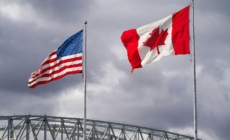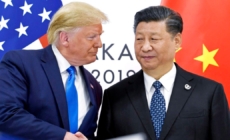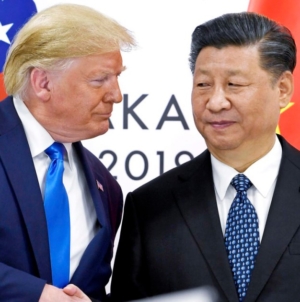-
Prince Harry sets record straight on US citizenship plans on podcast - 4 mins ago
-
Senate approves Democratic resolution to block Trump’s tariffs on Canada - 6 mins ago
-
U.S., China hope to make progress on tariffs as Trump and Xi meet in South Korea - 19 mins ago
-
Chiefs are back in their style points era, Bills untested, Colts benefit Power of PR on Nick's Tiers - 30 mins ago
-
Santa Ana winds, heat trigger SoCal power shutoffs for thousands - 39 mins ago
-
Major flooding expected along East Coast: What to know - 40 mins ago
-
Katy Perry romance makes Justin Trudeau ‘much happier’ after split: report - 44 mins ago
-
Inside a high-security Chinese factory pumping out fentanyl - about 1 hour ago
-
For some L.A. Latinos, ICE raids tested their Dodgers faith. Can the World Series bring them back? - about 1 hour ago
-
LSU Makes Major Decision for Coaching Search - about 1 hour ago
Trump’s Path to Peace in Sudan Lies With His Arab Influence—And Pressure
As U.S. President Donald Trump touts a record of securing peace deals across the globe, the White House is mobilizing efforts to quell a bloody African conflict that the United Nations considers to be the worst humanitarian crisis in the world today.
But as Sudan’s civil war escalates, with the paramilitary Rapid Support Forces seizing control of the Darfur region capital of el-Fasher from the Sudanese Armed Forces, a conflict already imbued with deep-rooted local feuds, widespread reports of atrocities and competing international interests will prove a steep challenge for the administration.
To navigate the precarious steps ahead, U.S. officials are working with counterparts from Egypt, Saudi Arabia and the United Arab Emirates, part of the so-called “Quad” established following the outbreak of the conflict in April 2023. The four powers advanced their collective endeavor last month through a five-point joint statement that would serve as a roadmap to a negotiated end to the war and U.S. officials told Newsweek that discussions have since been held to bolster the initiative amid worsening conditions.
And whereas Trump’s predecessor, then-President Joe Biden, was unsuccessful in advancing a lasting resolution to the war, experts argue that the current administration’s decision to channel influence and—when necessary, exert pressure—vis-à-vis Arab partners could prove more effective, as was the case this month in securing a ceasefire in Gaza.
“Since the earliest days of the current war, it has been clear that the road to peace ran through Arab capitals, particularly Cairo, Riyadh and Abu Dhabi,” Alex de Waal, executive director of Tuft University’s World Peace Foundation, told Newsweek. “The belligerents cannot pursue the war at scale without external support and stemming that support is a precondition for making progress.
“The Biden administration failed to pursue this. It would have required serious engagement from the secretary of state or president, and neither were prepared to do that. So, they handed it off to the Africa Bureau at State, which was guaranteed to go nowhere, because no Africa bureau official has sufficient standing in those Arab capitals. And as feared, that is exactly what happened.”
Now, he argued, Secretary of State Marco Rubio “has got the formula correct for the first step and the outline plan for the peace process is surely the correct one.”
The Plan
The Trump administration has thus far pursued a two-pronged approach to the war. On the international level, this entails working with fellow Quad members to push the five-point plan unveiled in September.
“The United States continues to engage with our Quad partners to coordinate efforts toward achieving durable peace in Sudan, including implementing the commitments outlined in our September 12 statement,” a State Department spokesperson told Newsweek. “These commitments focus on securing a humanitarian truce, establishing a permanent ceasefire, advancing a transition to civilian governance, and halting external support that fuels the conflict.
“The Quad is focused on addressing both temporary, localized cessations of violence in el-Fasher and other areas of urgent need, as well as nationwide agreements that can pave the way for lasting peace. We are deeply concerned about the situation in El Fasher, which has been cut off from humanitarian assistance for far too long.”
A senior administration official further added that “recent Quad meetings have focused on laying the groundwork for a ceasefire and subsequent peace process and coordinating members to further the objectives of the September 12 Quad joint statement.”
“The goal is to pave the path for a cessation of violence, alleviation of suffering for civilians, and a return to long-term stability as a pathway to future prosperity,” the senior administration official told Newsweek.
On the local front, the State Department spokesperson noted that “the United States also continues to actively and directly engage the RSF and SAF at all levels, with the immediate goals of pressing toward a durable peace and ensuring unhindered humanitarian access to alleviate the suffering of the Sudanese people.”
“Ending wars is a priority for President Trump and the United States remains focused on working with our partners and other stakeholders to resolve the crisis in Sudan,” the spokesperson added. “Engagement with both the RSF and SAF is essential to achieving this goal. Given the immediate urgency of de-escalating the violence, we will continue to engage with the belligerents to end the conflict.”
Roots of War
This urgency is felt most presently within Sudan, where some estimates indicate that more than 150,000 have been killed, either as a direct result of the war or the humanitarian crisis that has ensued. Nearly 9 million people have been internally displaced, and more than 3 million more have fled the war-torn nation rife with malnutrition, disease and poverty.
The conflict has its roots in a feud between two of the country’s most powerful men to emerge in the wake of longtime President Omar al-Bashir’s April 2019 ouster at the hands of the military amid popular protests.
The coup was followed by 2 1/2 years of mixed civilian-military rule under the Transitional Sovereignty Council, an entity led by President Abdel Fattah al-Burhan, a top military officer, and Prime Minister Abdalla Hamdok, a former U.N. official. Relations with the U.S. improved during this time, particularly with Sudan opting to join the Trump-led Abraham Accords by establishing diplomatic ties with Israel in exchange for sanctions relief in early 2021.
But Burhan disbanded the Transitional Sovereignty Council in October 2021, instituting an effective military government. Tensions ensued between Burhan and another senior military official, Mohamed Hamdan Dagalo, widely known as Hemedti, who leads the Rapid Support Forces and began to challenge what he viewed to be a consolidation of power by his former ally.
The Rapid Support Forces have their roots in the former Bashir administration’s integration of predominantly Arab militias, known as the Janjaweed, that aided the government against rebel factions in the Darfur War, which ran from 2003 to 2020, resulting in a peace deal reached by the Transitional Sovereignty Council. Dagalo, a member of the leading council, went on to aid Burhan’s dissolution of it but later came to oppose the move as the rift between them deepened.
The dispute devolved into civil war in April 2023 as the Rapid Support Forces launched a series of attacks against government and military positions nationwide, seizing parts of Khartoum and other cities. While the Rapid Support Forces were reportedly routed from the capital earlier this year, Dagalo’s troops have entrenched and advanced elsewhere, with their recent victory in Darfur now effectively dividing the large African nation in two.
This development, while carrying with it new risks for Sudan’s future, may also bear opportunities for an eventual settlement, or at least a temporary cessation of hostilities.
“There might be a glimmer of hope from the disaster in el-Fasher, in that the country is now territorially partitioned [de facto] so the two sides could come to the table to negotiate,” de Waal said. “But the history of this is that when each side suffers a defeat, it wants first to avenge the defeat before talking; and when one side has scored a victory, it wants to press home its momentum before talking.
“Assuming that success is achieved at a ceasefire, the next challenge—a big one—is getting the Sudanese to hammer out a workable peace in detail, that meets the demands of the Sudanese for democracy.”
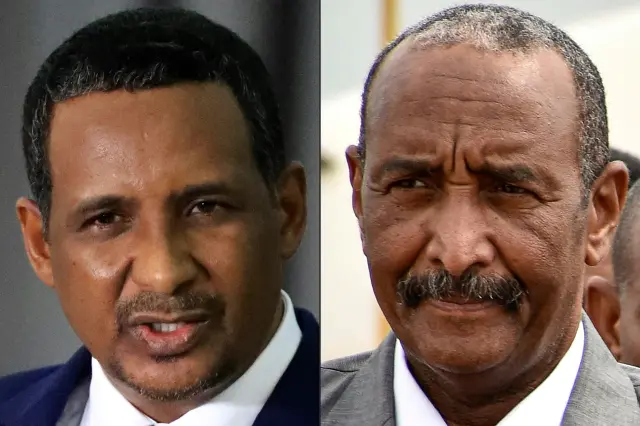
Globalized Conflict
The quest for peace in Sudan is further complicated, however, by the emergence of competing international interests in the conflict. While these murky ties remain difficult to independently verify, a number of neighboring nations and foreign powers—including Quad members—have been accused of supporting either side in a conflict in which both parties have been hit with allegations of human rights abuses.
These include reports of Egypt, Iran and Russia backing the Sudanese Armed Forces and of Chad, Ethiopia and the UAE aiding the Rapid Support Forces. The UAE’s alleged ties have especially been in the spotlight, with U.S. lawmakers calling on the White House to crack down on weapons shipments, though Emirati officials have repeatedly denied the claims.
Newsweek has reached out to representatives of the Sudanese government, the Rapid Support Forces and the UAE for comment.
The conflict has also spread beyond Sudan’s borders, with waves of refugees fleeing to neighboring countries and scores of weapons flowing into the country. Reports have indicated cross-border clashes involving Chad, South Sudan and Libya, which is itself divided between the internationally recognized Government of National Unity in the west and the rival Government of National Stability in the east.
The Rapid Support Forces’ seizure of a key tri-border point with Egypt and Libya has provided the group with additional connectivity across the region, including with the Government of National Unity-backed Libyan National Army that has been accused of aiding Dagalo’s faction. As the potential looms for the crisis to spread even further throughout the continent, parties appear to be doubling down on efforts to resolve it.
“In my view, the calamitous consequences—famine, mass refugee flows, destabilization of neighboring countries and instability along the shores of the Red Sea—are far more consequential than the neighboring countries’ stakes in the political outcome of the war,” de Waal said. “So, it ought to be straightforward to make the case for a peace settlement.
“But the Trump Administration is running into the problem that for the most significant external player—the UAE—Sudan is a low-priority issue in its dealings with Washington. The two countries have much bigger fish to fry in their bilateral relations. So, until Rubio—or Trump himself—weigh in, this is going to remain stuck.”
Liam Karr, who serves as lead for the Africa Team at the American Enterprise Institute’s Critical Threats Project, also argued that the White House would need to undergo a more concerted effort to address the Rapid Support Forces and its international ties.
“Threatening conditional consequences on the UAE, which the U.S. has ample leverage to do, given the UAE is a major U.S. defense partner, would both hold the UAE accountable and increase pressure on the UAE to cut support to the RSF and corral the group toward peace talks,” Karr told Newsweek. “This is particularly needed with the unfolding RSF atrocities in el-Fasher.
“The U.S. has already sanctioned both the RSF and SAF, but it has levied additional sanctions on the SAF for its use of chemical weapons and Islamist ties. It should hold the RSF to the same standard.”
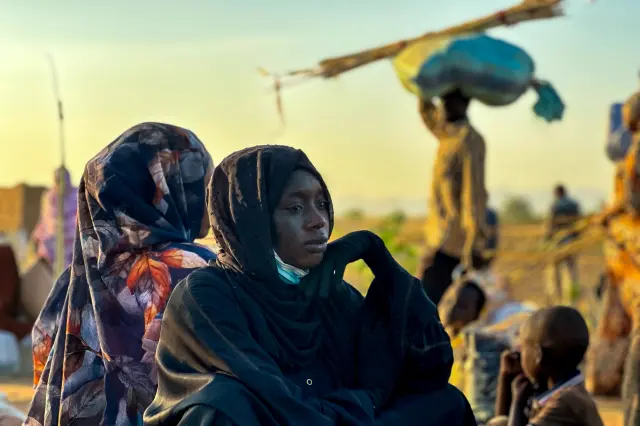
Trump the Transactor
Karr felt that there were pros and cons to Trump’s signature style of transactional diplomatic maneuvering that has secured resolutions elsewhere in the world, including between the Democratic Republic of the Congo and Rwanda, as well as between Egypt and Ethiopia, though both situations remain volatile.
“Trump’s transactional diplomacy can help mediate an agreement among the Quad actors in which everyone gets something and agrees to restrain their warring partners in Sudan,” Karr said. “Such a deal would cut external support to the warring factions, which is a necessary prerequisite to an initial ceasefire and eventually more comprehensive peace talks involving domestic actors.”
But “while a perk of transactional diplomacy is a willingness to pragmatically engage all parties in the name of saving lives,” he argued that “such an approach can turn counterproductive if it overly rewards aggressors and fails to address deeper-rooted issues.” And he viewed the use of “more ‘sticks’ as part of the transactional calculus, particularly against the RSF and UAE,” as a potentially effective way of effecting change.
Yasir Zaidan, a doctoral candidate at the University of Washington and former lecturer at the National University of Sudan, came to a similar conclusion regarding the potential pressure the Trump administration could apply on Abu Dhabi, whose alleged military and logistical backing to the Rapid Support Forces he called “the main obstacle for the U.S. in Sudan.”
At the same time, he argued that a Trump strategy could motivate cooperation by satisfying interest on other fronts.
“A transactional approach could involve pressuring the UAE to end its military backing of the RSF while allowing it to maintain its financial and commercial interests in Sudan,” Zaidan told Newsweek. “Such an arrangement could incentivize peace by aligning the UAE’s economic goals with regional stability.”
Zaidan viewed this approach as being even more critical than the Quad framework, which despite recent movement, has repeatedly underdelivered in terms of tangible peace proposals.
“Reports from the recent Washington, D.C., talks suggest that a proposed ceasefire was blocked by the UAE, which allowed the RSF to take el-Fasher and commit further atrocities,” Zaidan said. “A U.S. strategy that confronts these regional dynamics head-on and prioritizes the protection and political agency of Sudanese civilians stands a far better chance of achieving genuine peace and accountability.”
Source link

